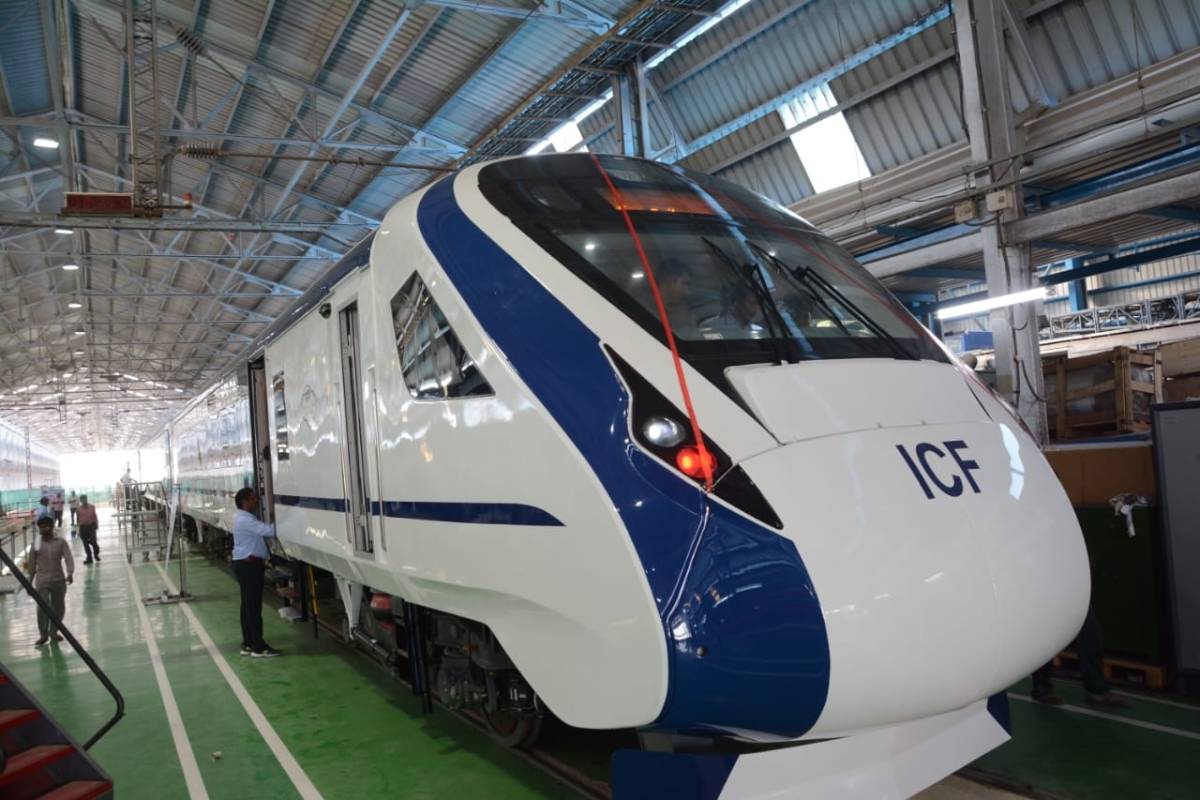Indian Railway Minister Ashwini Vaishnaw said the upgraded Vande Bharat train is expected to be ready for tests in April and commercial production is expected to start in August/September, 2022…writes Venkatachari Jagannathan
Rolling out 400 Vande Bharat Express trains is about Rs 40,000 crore of business coupled with jobs and other spin-off benefits, said senior officials –present and past — of Indian Railways
Presenting the Union Budget for 2022-23, Indian Finance Minister Nirmala Sitharaman said 400 new energy efficient Vande Bharat trains will be introduced in three years.
The Vande Bharat Express is a semi-high speed train designed, developed and built by the Integral Coach Factory (ICF) at a frugal outlay of Rs 100 crore.
The Indian Railways officials preferring anonymity told that 400 Vande Bharat trains over the next three years is not just headline catching announcement. It is about Rs 40,000 crore business opportunity that would also create 15,000 jobs and several spin -off benefits.
Presently there are only two Vande Bharat trains that are running — Delhi to Varanasi and Delhi to Katra.
“The trains without a pair are running six days a week without a breakdown till date since they were pressed into service a couple of years back. Perhaps Vande Bharat Express is the first train that is run without a pair,” a senior official at ICF told with pride.
It is one classic example of ‘Make in India’ and far cheaper than similar trains that are rolled out by foreign companies.
The train has only about 15 per cent import content which will further go down if production volumes increase, officials told earlier.
An ICF official said the third prototype is getting delayed due to production bottlenecks and logistical challenges due to the Covid-19 pandemic.
However, how the government is going to achieve its target of 400 Vande Bharat Express trains over the next three years is the Rs 40,000 crore question.
While it is really an ambitious target, it can be achieved in a staggered manner with the government giving better clarity on its plans, officials said.
Indian Railway Minister Ashwini Vaishnaw said the upgraded Vande Bharat train is expected to be ready for tests in April and commercial production is expected to start in August/September, 2022.
“I would think that a more realistic target of say 100-150 trains in three years would have been better. This target itself would need very concerted and committed action by railway executives, particularly at ICF,” Sudhanshu Mani, retired General Manager, ICF and the Creator of Vande Bharat Express told.
He said, commercial production and necessary testing of the upgraded train is expected to start only in September 2022 and hence the target should be realistic.
“Rolling out the trains in large numbers may not be an issue. But where are they going to be deployed? The routes also have to be finalised,” Mani added.
Continuing further Mani said ICF should start working on Vande Bharat trainsets, including the sleeper version (code named Train 19) and 300 units of aluminium body trainsets (code named Train 20).
“There can be a foreign partner for rolling out aluminium body trains. In 5/6 year’s time 400 trains can be there,” he remarked.
When pointed out that the train could be rolled out by other coach manufacturing facilities in the country Mani said: “Initially only ICF should roll out as they understand the technology and other aspects. Spreading out the production to other units will result in quality issues.”
Concurring with him, a senior official not wanting to be quoted told IANS: “Only ICF should make it. It needs special skill sets and trained people are not available in other units.”
Officials also said spreading out the manufacturing not only would result in quality issues, but the ultimate death of the train that is successfully running without a hitch six days a week for the past couple of years.
While ICF would initially roll out the trainsets, the other units can take care of the maintenance works and acquire the production knowhow.
The other question is the availability of the vendors. Unless the government gives a clear roadmap, vendors may not ramp up their production capacity, officials said.
“The supply chain will take time to gear up. They can supply only at a steady rate. Out of the 400 trains, during the first year only 20 trains can be rolled out and 380 trains in the remaining two years is not possible,” the official added.
Further vendors and ICF officials are reluctant to touch the Vande Bharat train project after the witch hunt in the form of vigilance enquiry that was conducted and concluded recently without finding any discrepancy.
According to officials, there needs to be long term contracts — say 60 trains for the next 10 years — only then vendors can set up production facilities.
“Tenders and procurement process should be done in such a way that vendors can participate without worry,” they added.
ALSO READ-IIT man Parag is new Twitter CEO

Leave a Reply